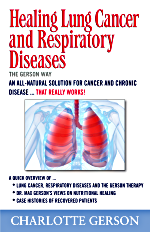| |
Archived from
Charlotte Gerson's booklet

Story
In
mid-August 1989 John Peters turned 60 years of age. He was
working out regularly, and five days a week was also swimming
1000 yards. He had never been a smoker, ate a good diet, and had
only missed work once in 30 years. After giving him his annual
examination, his doctor pronounced him in excellent health.
Just two months later, however, he had a persistent cough. In
November he underwent open chest surgery for non-small cell
lung cancer. The operation was followed by 24 radiation treatments
which seemed to work - for a while. About a year later, he
developed another cough and began losing weight, strength and
energy. "I was like a wind-up toy that was running down" he later
recalled of this time, "and the doctors were not helping."
After being hospitalized for a bronchoscopic examination, Mr.
Peters' physician said that he would again have to have open-chest
surgery to remove the recurring cancer. When he refused both
surgery and chemotherapy, they told him that he had no chance
for survival.
"I had researched lung cancer, and realized that the only reason
I got cancer was that my body supported it," he wrote when
giving us the story of his recovery. "Thus, if I didn't change the
internal environment of my body, the cancer would just come
back again."
John started on the Gerson Therapy in May 1991, and he did it
at home. "I was very weak and the therapy was demanding," he
said. "But I was facing the Grim Reaper and was highly motivated.
In only three weeks, I knew it was working, I was getting
stronger, coughing less, and feeling much better. Most surprising
of all, I was actually gaining weight on this vegetarian diet after
losing so much for months, I had become just skin and bones!"
About one year after starting Therapy, John Peters reported, he
returned to his pulmonary specialist. He found out later that the
physician had stated in his medical records that "the patient is fine
with no sign of cancer, so our diagnosis was undoubtedly wrong."
Before having surgery in 1989, John had obtained a second
opinion from the head of the Pittsburgh Cancer Institute. In 1996,
when he returned there for a follow-up test, the head physician
was shocked to see him. "He said that I'd never know how lucky I
was to be alive. He told me that with my disease, there was only
about a 3% chance of survival."
In a communication to the Gerson Institute in 1999, John
Peters could tell us this: "I have remained cancer-free and in
reasonably good health for the past seven years. I am vegan, avoid
refined flour, sugar, salt, caffeine, and alcohol; and I still juice
about 24 ounces per day. There is no doubt in my mind that I
would have been in the cemetery six or seven years ago without
the Gerson Therapy."
But he had gone through a harrowing period earlier. In November
1992, John had suddenly began to see double. "The doctors
suspected that the lung cancer had spread to my brain," he said,
"but all tests were negative. The problem went away ... until the
following November, when the double vision recurred. My mother
and favorite uncle had both suffered from myasthenia gravis,
which is what I was diagnosed with."
The condition cleared up with medication, but again returned
the following November. "After appearing for three consecutive
years only in November," Mr. Peters told us, "I asked God what
this meant. But it turned out that on Halloween, I would eat
leftover Halloween candy. I have not eaten candy since November
1995. And though I had been told that I was permanently disabled
and would never recover, I have had no sign of myasthenia gravis
since then.
Last news from John Peters: November 2002. He writes that he
is well and truly enjoying his two sets of twin grandchildren that,
he states, "without the Gerson Therapy I would have died before
getting to know them."
Two interesting statements in this patient's report deserve
further commentary:
1) Doctors tend to reason backwards, so that if a cancer patient
who was declared by them to be in a "terminal" condition somehow
recovers, they assume that the diagnosis was wrong. I have
some problems with this observation. Since the doctors had
suggested open chest surgery and chemotherapy when the patient
presented with an apparent recurrence of lung cancer, were they
criminally suggesting unnecessary treatments? It is unethical and
even illegal to alter medical records, yet at the Gerson Institute
patients often report that their doctors tell them because they got
well, they had initially been misdiagnosed.
2) The other point I should like to make is that this patient also
recovered from myasthenia gravis. At the Gerson hospitals, we
rarely see cases with this condition. Yet here we have a report that
the Gerson Therapy was able to overcome this serious health
problem, too.

|
|
